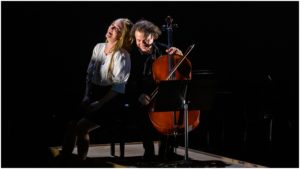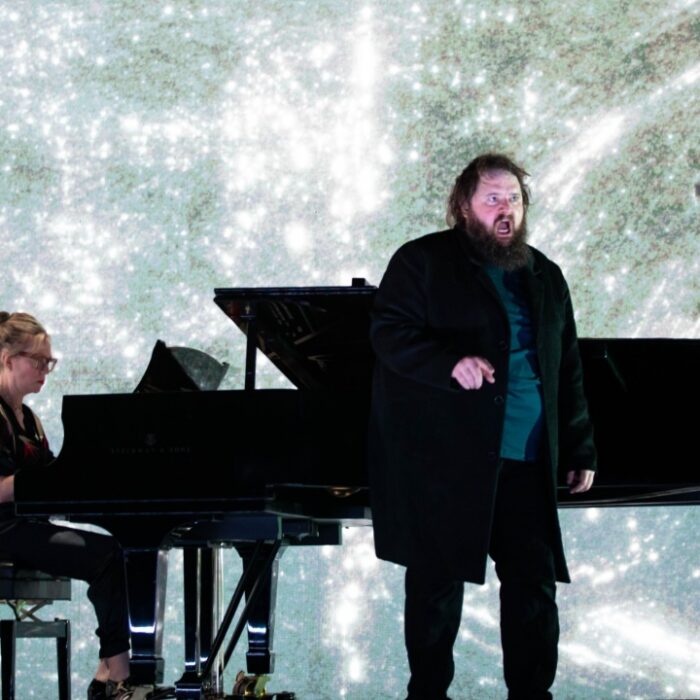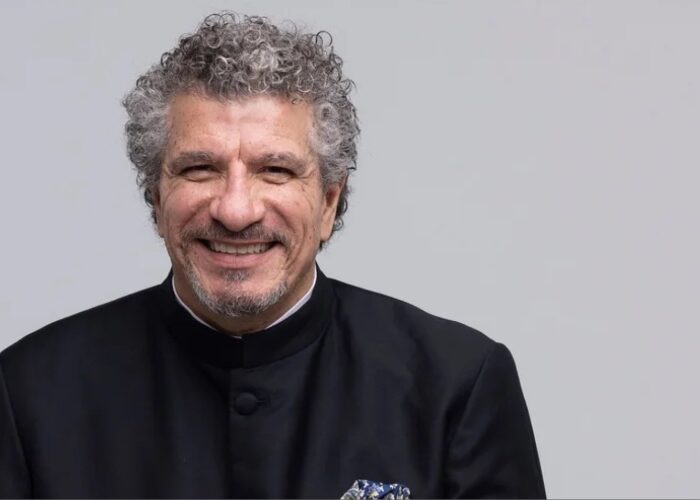
Jacqueline – Luna Pearl Woolf Turns Celebrated Cellist’s Story Into an Opera
By Greg WaxbergCredit: Dahlia Katz
Composed for only two performers, the first opera written about the life of legendary cellist Jacqueline du Pré received its world premiere this past February in Toronto.
Tapestry Opera, the only Canadian company dedicated to the creation, development, and performance of original Canadian operas, presented the first five performances of “Jacqueline” by Luna Pearl Woolf and Pulitzer Prize-winning librettist Royce Vavrek.
The opera is scored for one soprano and one cello, as Woolf wrote it specifically for Marnie Breckenridge and Matt Haimovitz. The idea for the work came from Woolf’s desire to use a small ensemble for a dramatic story.
Cellists All Around
Four years ago, she was dazzled when Breckenridge and Haimovitz performed her chamber pieces “Rumi: Quatrains of Love” and “Odas de Todo el Mundo,” both written for soprano, cello, and piano.
“I was inspired by their mutual electricity and exquisite musicianship,” Woolf told OperaWire. “It was clear to me that the two of them could do something amazing together in a dramatic work.”
At the same time, Woolf has been surrounded by cellists—her father is an amateur cellist in local quartets and orchestras, while Haimovitz has been her creative partner in many projects for over 20 years—making Jaqueline du Pré’s story and legacy part of her “musical consciousness.”
She envisioned an opera in which the soprano and cellist would be equal dramatic contributors—and characters. But how to compose for one voice and one instrument?
“The challenge of making a dramatic story come alive with just one voice was exciting [and] the cello is the most human of the instruments, both sonically and visually. It was a joy to sculpt something that had drama and dialogue within the context where you only heard words from one character, but emotion and storytelling could come from both.”
Woolf did extensive research in order to capture du Pré’s life, personality, and musical gifts. Haimovitz knew her personally from intimate visits with her toward the end of her life, in which he experienced firsthand the joy she took in listening to her own recordings. He helped the creative team of “Jacqueline” contact other people who knew her, for first-person accounts, and the group read, listened, and watched as much as possible for background.
“In representing du Pré and her cello onstage,” Woolf said, “Marnie and Matt took inspiration from all these sources and brought their own experiences to share in a highly collaborative setting.”
Of course, mention the words “Jacqueline du Pré” and “recording” in the same sentence, and one immediately thinks of Elgar’s Cello Concerto, the piece with which the famed cellist is most identified. Throughout the opera, Woolf incorporates fragments of motives, to “imply something that we recognize, without explicitly going to the Elgar,” as well as ideas reminiscent of other concertos that du Pré’s audiences would have recognized.
Choosing The Unconventional Path
Although the opera was inspired by Jacqueline du Pré’s life and depicts her struggle with Multiple Sclerosis (MS, a disease of the central nervous system), the piece does not tell her story in a linear way.
Instead, the audience sees du Pré at key moments, watching her advance from an eager five-year-old child discovering the cello to her end-of-life health struggles.
“In the libretto,” the composer noted, “Royce and I found a way to peek in at slivers of her life that help us understand where she was coming from, who she was, and what she was going through.”
For the depictions of and references to MS, the creative team researched its progressive effects on the body and how the medical community understood the disease at the time; Breckenridge specifically researched how the body’s movements change over the course of the disease; and the team also incorporated what they learned about du Pré’s experience with the symptoms.
People from the MS community attended the February performances, and Woolf was moved by their reactions—one individual recognized her own circumstances in one of the scenes.
After composing “Jacqueline,” Woolf has a renewed respect for du Pré’s artistry.
“She had a clear, natural instinct and innate confidence in her musicianship. Such a powerful, expressive language—communicated through phrasing, articulation, and even in the spaces between each note she played—is a marvel. She owned it, she knew it, it was there within her. To see her play was to feel that. What moved me deeply was how much she sacrificed to live the life that she wanted to be living.
“For example, when she converted to Judaism to marry Daniel, she did that for love of Daniel and love of music with the same complete commitment that she did everything else. Then, when she got sick, she paid for that decision with the loss of support from her own family. The fact that her mother was not there for her, partly because she believed Jacqueline’s conversion had been wrong, was heartbreaking.”
Looking to future performances, once people can gather again, Woolf says the opera “is perfect for a small space with a small number of people because it’s so intimate to be in the room with these two beautiful performers.”
“Jacqueline” was nominated for five Dora Awards, presented annually by the Toronto Alliance for the Performing Arts to honor theater, dance, and opera productions in Toronto; Marnie Breckenridge won for Best Individual Performance.
A highlight reel from the World Premiere, as well as video from the rehearsal workshops, are available on YouTube. Companies interested in learning more can contact Tapestry Opera or Black Tea Music.



